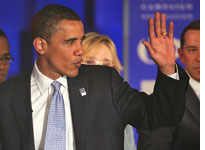
Do you need to know the name of Pakistan's leader to be a good president? - By Anne Applebaum - Slate Magazine
Candidate Obama recently said that he would not hesitate to order a strike against Osama Bin Laden on Pakistani soil if he had credible, actionable intelligence. This was shortly after one of the televised debates where he indicated he would talk to foreign dictators, a position that brought him under fire from most of the other candidates. Seeking to show that he could be a strong leader, he made these comments about Pakistan. His opponents have spun his statements about meeting foreign leaders as an issue of whether or not he has the experience to be President. Hillary uses it to highlight her "experience", which she regards as a major element that makes her the superior candidate. She however mirrored his comments about striking against Bin Laden on Pakistan soil, not to be outdone.
But this is not about experience. And what Obama's campaign trail pandering statement, the spin efforts of his rivals and the "me too" response of Sen. Clinton betrays is not a lack of experience but of analysis.
The relationship with Pakistan and its role in the fight against the Osama terror network is a complicated one. Obama says he would strike against Osama there if we had actionable intelligence. Duh. So would the Bush administration and in fact they have hit targets on Pak soil in the past. But they have done so without acknowledging such strikes, preserving plausible deniability to leave Musharaf room to maneuver. You can bet U.S. Special Forces have an ongoing presence in the tribal areas outside of government control hunting Osama and his top leadership. But we don't advertise it in order to preserve the political relationship that facilitates that hunt.
The point is that there is a balance that must be struck in the war on terror and the different fronts in that war are connected. Actions taken on one front can have serious consequences on another. What made Obama's statement noteworthy was that it was "war" talk coming from a democrat and certainly not what the left wing of his party would say, not because it was indicative of some comprehensive world view. Hillary had to follow suit to avoid being painted into a lefty corner. But in both cases, the response indicates that they have not taken their analysis of the global war on terror and American tactics for fighting it far enough. They are hardly alone in this failing within the Democratic party. There are a variety of views represented within the Democratic party. In most cases, they all betray the same lack of a complete world view or analysis based thereon, and the party itself has no dominant consensus on Iraq or its geopolitical anti-terror strategy. The top candidates exemplify this weakness.